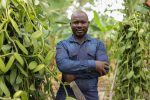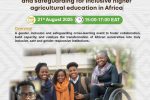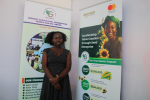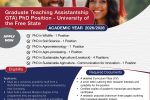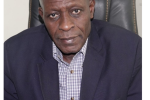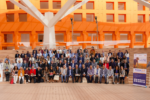Sheku Nyumah Gbollie: A Climate and Soil Graduate Turned Entrepreneur
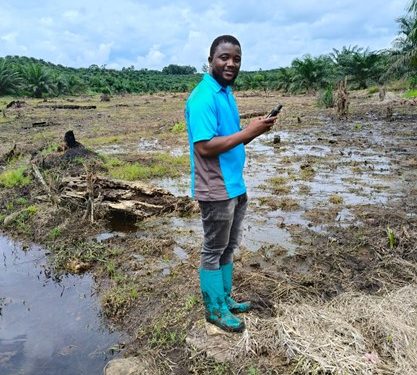
In the opulent green fields of northwestern Liberia, rice farmers have long wrestled with the paradox: despite rice being Liberia’s staple food, the country spends nearly USD200 million annually importing it[1]. It is striking that the very crop which is primarily consumed remains inaccessible to many of its farmers.
Why? The challenges are many: less than 6% of rice farmers use certified seeds[2] and there is just one (1) agricultural extension worker for every 33,000 farmers[3]. Added to that is poor infrastructure, limited electricity (only 32.5% of Liberians have access[4]), insufficient institutional support, and almost no access to credit – it becomes clear why farmers are trapped in cycles of low yields and productivity.
However, optimism is taking root amid this obstacle, manifesting in the form of a young man’s transition from displacement to innovation.
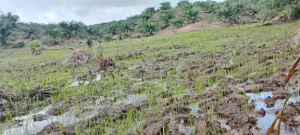
Sheku Nyumah Gbollie was just a boy when Liberia’s second civil war forced him and his family to flee their home in Foya, Lofa County. While his family returned home in 2004, Sheku stayed behind in Sierra Leone to finish school in Koindu, until 2013, when he finally returned to Liberia.
Fast forward to today, Sheku is not only a Technical Assistant at Liberia’s Ministry of Agriculture, but also the Co-Founder and Executive Director of the Center for Renewable Energy and Climate Action (CRECA) – a grassroot enterprise that is helping farmers grow more rice, more sustainably.
“We saw critical gaps in extension services, seed access, and clean energy. CRECA was born to bridge those gaps,” Sheku explains. “it’s not just a business – it’s a response and action to the real needs of our people”
CRECA started with a bold idea: empower smallholder farmers with the tools and knowledge to grow climate-smart-rice, right here in Liberia. Armed with data from a nationwide baseline study, Sheku and his team developed a three-tier strategy:
- Seed multiplication using certified rice varieties
- Farmer Training on climate-smart techniques
- Community outreach through radio and social media
They began by cultivating 50 hectares of certified seed rice and partnering with farming cooperatives. The results were swift: higher yields, stronger crops, and rising interest from communities beyond the project area.
This momentum led to CRECA’s flagship program: Integrating Climate-Smart Agriculture Across the Rice Value Chain in Liberia (I-CARL Project), currently active in four (4) counties – Bong, Lofa, Nimba, and Margibi. The I-CARL project trains famers on eco-friendly practices that not only improve productivity but also build resilience against climate change.
“The calls haven’t stopped”, he says. “Farmers from across the country are asking to join, that tells us that we are doing something right”
Despite the progress, the journey hasn’t been without obstacles. Banks require collateral that smallholder farmers simply do not have. Donor-funded programs often come and go, seldom lasting long enough to create meaningful impact, and although research exists, their findings rarely reach the farmers on the ground for the required transformation.
“We started with limited funding and minimal access to advanced tools, but we were fortunate to have partners who believed in our long-term goal” Sheku admits.
Support came in many forms, such as scholarships and funding from RUFORUM, technical help from the Central Agricultural Research Initiative (CARI), the Ministry of Agriculture, and even university students, who joined as interns and research assistants, learning and working alongside farmers in the field.
To date, CRECA has created 629 employment opportunities for farmers involved in rice production. The organization’s long-term goal is to increase rice production by 40% and raise farmers’ incomes by 35%. But for him, the numbers are only part of the story.
“We are learning every day,” says Sheku. “One thing we know for sure is that when farmers have access to knowledge and opportunity, the transformation is real, and its theirs to lead”.
His own transformation, from refugee to scientist to changemaker, is a notable reminder of what is possible when talent is nurtured. As a beneficiary of the TAGDev scholarship program from RUFORUM in partnership with Mastercard Foundation at Egerton University, Sheku gained not only a qualification in Soil Science and Climate Change but also a platform to innovate beyond his thesis.
Today, CRECA is actively seeking new partnerships – both local and international to scale impact. From expanding seed banks to renewable energy utilization, the organization is steadily positioning itself to become a driving force in Liberia’s food system transformation.
To accelerate progress and ensure the long-term sustainability of this laudable initiative, CRECA has secured a grant of USD60,000 from RUFORUM. This funding will support the implementation of the next phase of the I-CARL Project, a 12-month programme scheduled to run from September 2025 to August 2026. The project will engage rice cooperatives and farmer-based organisations across Bong, Lofa, Margibi, and Nimba Counties, with a focus on promoting climate-smart agricultural practices, enhancing rice production, and encouraging the responsible and sustainable use of agrochemicals. In addition to targeting smallholder famers, the initiative will intentionally include marginalized groups such as refugees, internally displaced persons, and individuals with disabilities, this will ensure inclusivity and broaden impact. Through training, capacity building, and community-based engagement, the I-CARL Project aims to build resilience, improve food security, and support environmentally sustainable livelihoods in Liberia’s rice-growing regions.
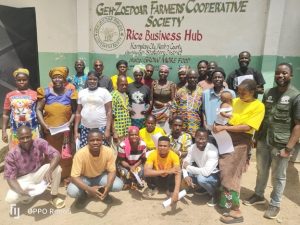
[1] https://www.moa.gov.lr/sites/default/files/documents/NADP_2024_2030_Full%20Final_July_10.pdf
[2] https://archive.aessweb.com/index.php/5005/article/download/4676/7375
[3]https://www.moa.gov.lr/sites/default/files/documents/LIBERIA%20MOA%20EXTENSION%20POLICY%20UPDATED%20FINAL_0.pdf
[4] https://blogs.worldbank.org/en/africacan/looking-ahead-perspective-on-the-national-electricity-utility-of-liberia
